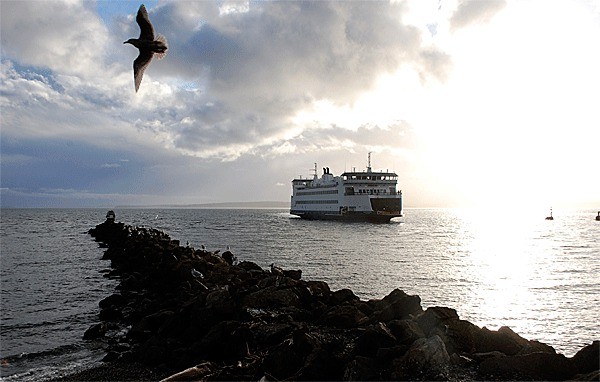What was recently just a possibility is now a full-blown threat: If Washington State Ferries’ funding model doesn’t change, the Port Townsend-to-Coupeville ferry route will remain a one-boat run year round.
State Ferries spokeswoman Marta Coursey confirmed that David Moseley, assistant secretary for ferries, told a crowd at a Jefferson County Chamber of Commerce meeting Monday that the transportation agency is so strapped for cash that it has few options left but to make hefty cuts.
Even though the Salish, the second of three Kwa-di Tabil class ferries being built, was promised to serve alongside the Chetzemoka on Central Whidbey during the busy spring and summer tourist season, it will instead be sent to the San Juan Islands as part of a ferry shuffle that will save about $10.5 million over two years.
The state Legislature could elect, however, to increase WSF’s funding or change its overall funding model to make the system sustainable.
“We are in dire straits,” said Coursey, in a Thursday interview. “He was trying to communicate that this isn’t business as usual, so that the Legislature knows that it won’t be businesses as usual.”
News that the second boat may never make it to Whidbey Island came out just prior to the christening of the Chetzemoka this past November. Initially, Moseley said it was just a possibility and was part of $17 million in cuts the agency identified in response to Gov. Chris Gregoire’s state-wide budget cut directives.
Coalition forms
Anticipating that the option may become a reality, Island County Commissioner Helen Price Johnson worked with members of the Ferry Advisory Council to establish the Coalition of Community Leaders, composed of elected officials and business leaders.
So far, coalition members include Price Johnson, Coupeville Mayor Nancy Conard, Sen. Mary Margaret Haugen’s office, the Ferry Advisory Committee and members of the prior Ferry Coalition, the Coupeville Historic Waterfront Association, Port Townsend community leaders, and Whidbey Island chambers of commerce.
According to Price Johnson, the coalition was created so that a clear and unified voice might reach decision makers concerning State Ferries’ plan. It is now almost certain that a group will travel to Olympia for the 2011 legislative session to lobby for the second boat and this will add weight behind their voice, she said.
Price Johnson said she knows full well the financial crunch the state is facing, and that legislators have some tough and unpopular decisions ahead. The reality is cuts have to be made, and sparing those proposed for the Port Townsend to Coupeville ferry route only means that they will have to come from somewhere else in the ferry system.
“But we also need to be clear about the effects those cuts can have,” Price Johnson said.
Hurts Navy, tourism
Oak Harbor Chamber of Commerce Director Jill Johnson, also a coalition member, said the news of State Ferries’ now-definite plan is disappointing. The loss of the Steel Electric ferries over the past three years has not only hampered travel between Whidbey Island Naval Air Station and Naval Base Kitsap on the Kitsap Peninsula, but it has had a significant impact on the flow of tourism.
“I think that’s about as much economic punishment as we deserve,” Johnson said.
And business leaders have already been through a long and difficult struggle to make sure the two older vessels were replaced with ships of equal size and vehicle capacity. Groups have traveled to Olympia twice since the Steel Electrics were suddenly retired, both to argue for the construction of large ferries and mitigation funds.
“It’s discouraging to have to go back and fight the same fight all over again,” Johnson said.
However, 10th District Sen. Mary Margaret Haugen, D-Camano, and chairwoman of the powerful Senate Transportation Committee, said no one needs to lose any sleep just yet. Reaffirming earlier statements, Haugen said emphatically that the people of Whidbey Island were promised the second boat and that is exactly what they are going to get.
Ferry officials can make any plans they want but in the end it’s the legislature that decides what happens with state-run services, she said.
“It (the Salish) was promised to them long before David was in the picture,” Haugen said of Moseley.
A series of community meetings throughout Puget Sound has begun to discuss ferry issues. The only one on Whidbey Island is scheduled to take place from 6:30 to 8:30 p.m. Monday, Dec. 13, at Langley Middle School in Langley.



